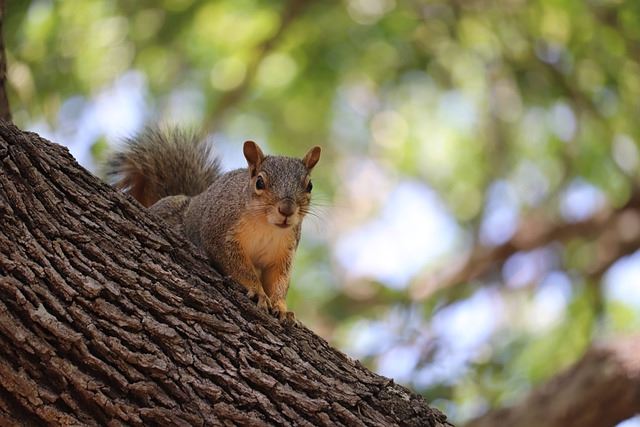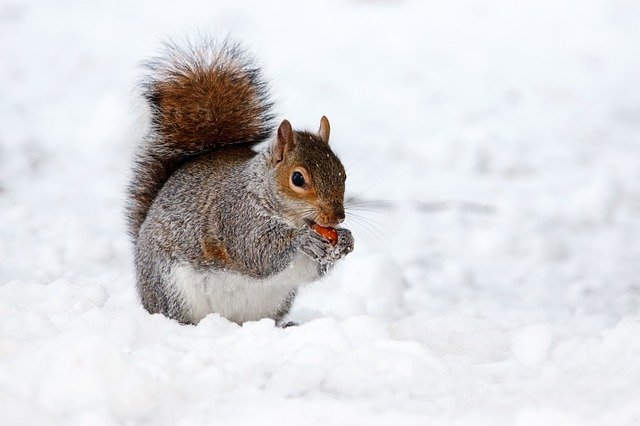You hear strange noises coming from inside your walls or up in your attic: faint scratching, chatter, or squeaking sounds. Or you find droppings in a crawl space, and they look like small dark brown bullets: they are not pellets, they are squirrel poop. Your home has been breached by Rodentia scuridae.
Squirrels are rodents (Order: Rodentia, Family: Scuridae, to be exact), or as many people not-so-affectionately refer to them, “tree rats.” They damage property not because they are mean-spirited animals, but because rodents’ teeth never stop growing. To keep those incisors in check, they must gnaw continually on things — you just don’t want it to be your things — like your bird feeder, porch, deck, siding, or worse yet: electrical wiring.
SQUIRREL SIGHTINGS

You catch a glimpse in your yard of what you think is a squirrel, but it is red. Or black. Or gliding down from a tree. There are actually many types of squirrels: red squirrels, black squirrels, gray squirrels, brown or fox squirrels, flying squirrels, tree squirrels, and ground squirrels.
The most common squirrel on the East Coast is the Eastern Gray Squirrel. Its species name is Sciurus carolinensis because it was first observed and recorded in the Carolinas. In fact, the Gray Squirrel is the official state mammal of North Carolina.
The other types of squirrels in North Carolina, according to the state Wildlife Resources Commission, are the Red Squirrel, which is smaller than the gray and lives mostly in the western part of the state, and the Eastern Fox Squirrel, which is larger than the gray. (Black squirrels are actually grey squirrels with a melanistic mutation (extra black pigmentation).
Also fairly common but not often seen are the nocturnal Southern Flying Squirrel and Carolina Northern Flying Squirrel. These night gliders have large eyes and a loose flap of skin between their front and back legs, which they use like a parachute.
ALL ABOUT SQUIRRELS

Q. What do squirrels eat?
A. Squirrels are primarily herbivores. They eat seeds, acorns, walnuts, hazelnuts, tree bark, buds, flowers, berries and bulbs. They will also sometimes eat birds’ eggs, insects, and even small snakes, according to the World Atlas. Squirrels will raid your bird feeder for sunflower seeds and millet, and they will plunder your garden to eat tomatoes, corn, strawberries, and other crops. Squirrels are hoarders; they hide thousands of food caches each season in which they store food for later use.
Q. Where do squirrels sleep?
A. Squirrels build nests, called dreys, in tree cavities and forks, or — if they’re lucky (and you’re not) your attic. They use dried leaves, twigs, grass, moss, and even feathers — or your insulation — to build their nests.
Q. Do squirrels hibernate?
A. Actually no, squirrels do not hibernate. They bulk up in winter with an extra layer of fat and a thick coat, but they are active all year.
Q. Are all squirrels nocturnal?
A. Most squirrels are actually diurnal, meaning they are active during the day, not generally at night. In subtropical states like North Carolina where summers are hot and muggy, they tend to avoid the midday heat and be most active in the early morning and evening. The scientific term for this behavior is crepuscular (extra points if you knew that).
Q. Do squirrels carry rabies?
A. Rabies is actually quite rare in rodents, and squirrels are rarely infected, according to the North Carolina Wildlife Resources Commission. However, squirrels can carry other bacterial diseases such as tularemia and leptospirosis, which they can spread through bites: they won’t attack unprovoked but will bite and scratch in self-defense.
Q. What are the differences between squirrels and chipmunks?
A. Chipmunks are actually a subfamily of squirrels. They are smaller, have shorter tails, and are usually reddish-brown in color with black and white stripes on their body and head.
Q. How often do squirrels reproduce?
A. Squirrels typically have one litter each year — sometimes two, if the first does not farewell. Litters are four to eight young, but only one in four survives to one year, and about half to two years. A baby squirrel is born furless, pink, and blind, nurses for at least 10 weeks, and will not reach full size for 8-9 months, according to the World Atlas.
Q. How long do squirrels live?
A. For squirrels that reach maturity, the average lifespan is six years in the wild. If they manage to elude their many predators — hawks, foxes, raccoons, owls, cats, dogs, and humans — some lucky individuals can live 12 years. In captivity, squirrels can live up to 20 years.
Q. Can squirrels survive terminal velocity?
A. Amazingly, squirrels can fall from any height and survive. They have a low terminal velocity due to their lightweight but significant wind resistance. In fact, they fare better in a fall from a tall building than from a tree, because they have more time to adjust their body position to slow their descent and absorb the impact.
HOW TO GET RID OF SQUIRRELS
While you could try to obtain your own permit and cage to tackle this yourself, we would encourage you to rely on professionals that have been trained in the biology of these animals and the safe removal of wildlife from your home.
HOW TO KEEP AWAY SQUIRRELS
There are measures you can take to deter banished squirrels from returning — and to prevent new nuisances from moving in. Trim tree limbs back at least six feet from the home and close off any small holes, gaps in the siding, and attic vents with hardware mesh. It’s helpful to have a professional check over your home for potential entry points. Professional pest control companies should also be able to help by installing high-quality, professional-looking materials and products for squirrel prevention.
Driving squirrels out of your yard and protecting your garden is more challenging — but not impossible. To start with, make sure your garbage containers can be closed securely with latches, cords, or straps, don’t leave pet food outside, and squirrel-proof your hanging bird feeder with a baffle, or hood.
To deter squirrels from digging up bulbs, HGTV recommends using decorative rocks for mulch and incorporating daffodils, which are inedible to squirrels, and hyacinth, snowdrops, and allium, which they dislike. Planting peppermint at the edges of your veggie garden is a great deterrent, as squirrels avoid the strong smell.
Other natural repellents, says the Old Farmer’s Almanac, include spices like cayenne pepper, ground chili pepper, and red pepper flakes; spread them on and around target plants. Save dog hair and mix it into the mulch; the scent will deter squirrels. If you have the stomach for it, use repellent sprays made with predator urine or put up hunting perches to attract predators like owls and hawks.

